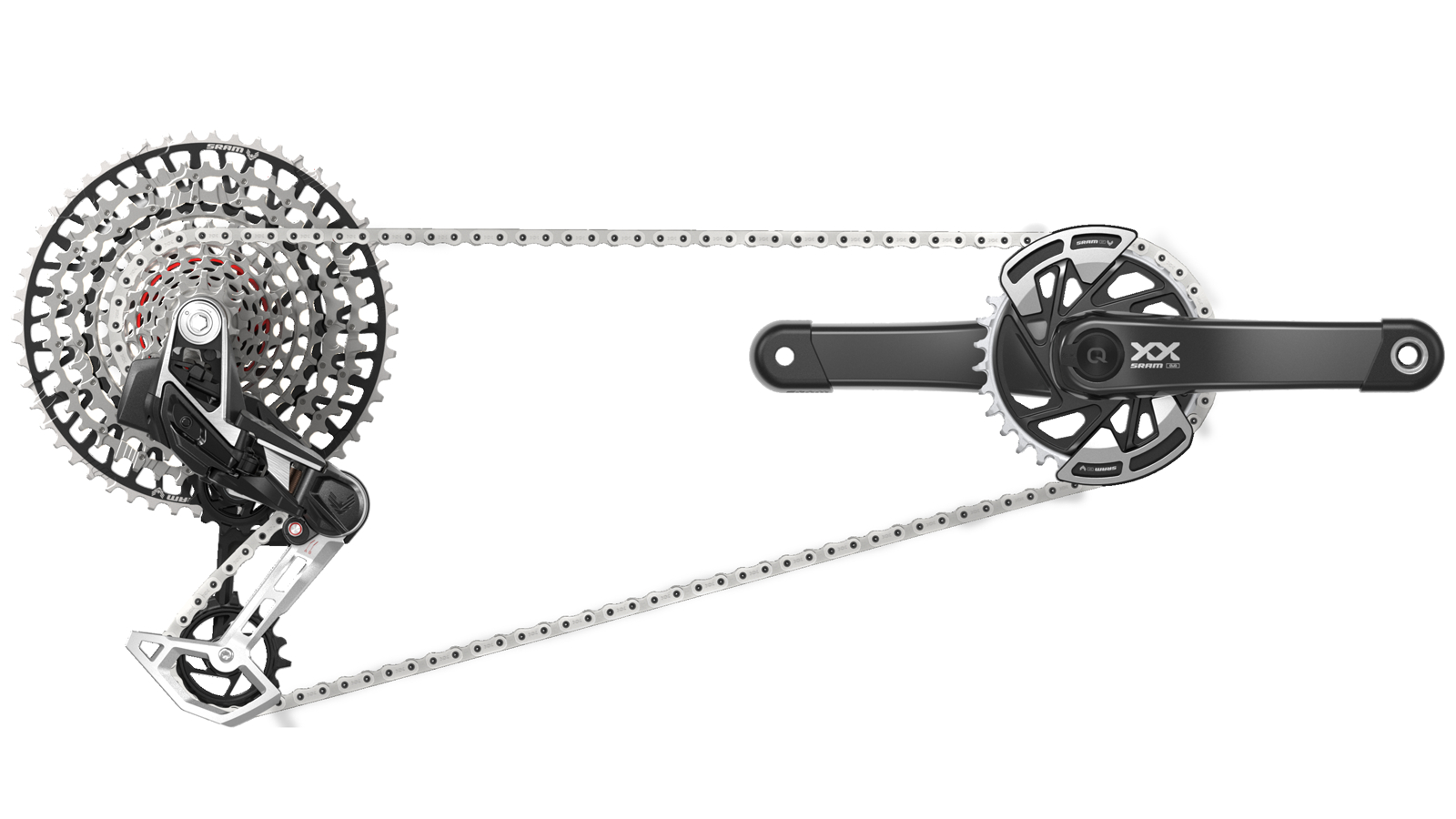
How radical is it really?
There’s been a lot of excitement about SRAM's new Eagle Transmission with words like ‘revolutionary’ and phrases like ‘game changer’ thrown around like confetti. The fact that it gets rid of gear hangers is a big deal and it does shift really well. More level-headed folk have pointed out it’s still a parallelogram mech moving a chain across a 12-speed cassette under command of a pre-existing wireless protocol though. That means it’s not as radical as mechs hidden inside the rear swingarm, hydraulic mechs like those from Rotor or gearbox systems. So maybe ‘evolutionary’ and ‘game modifier’ are more accurate but that’s not really going to get you clicks on Google is it?
Just in case you've ended up here but were really looking for some opinion on the new drivetrain rather than this Bespoken Word FAQ special, then here's my SRAM XX SL Eagle Transmission review.
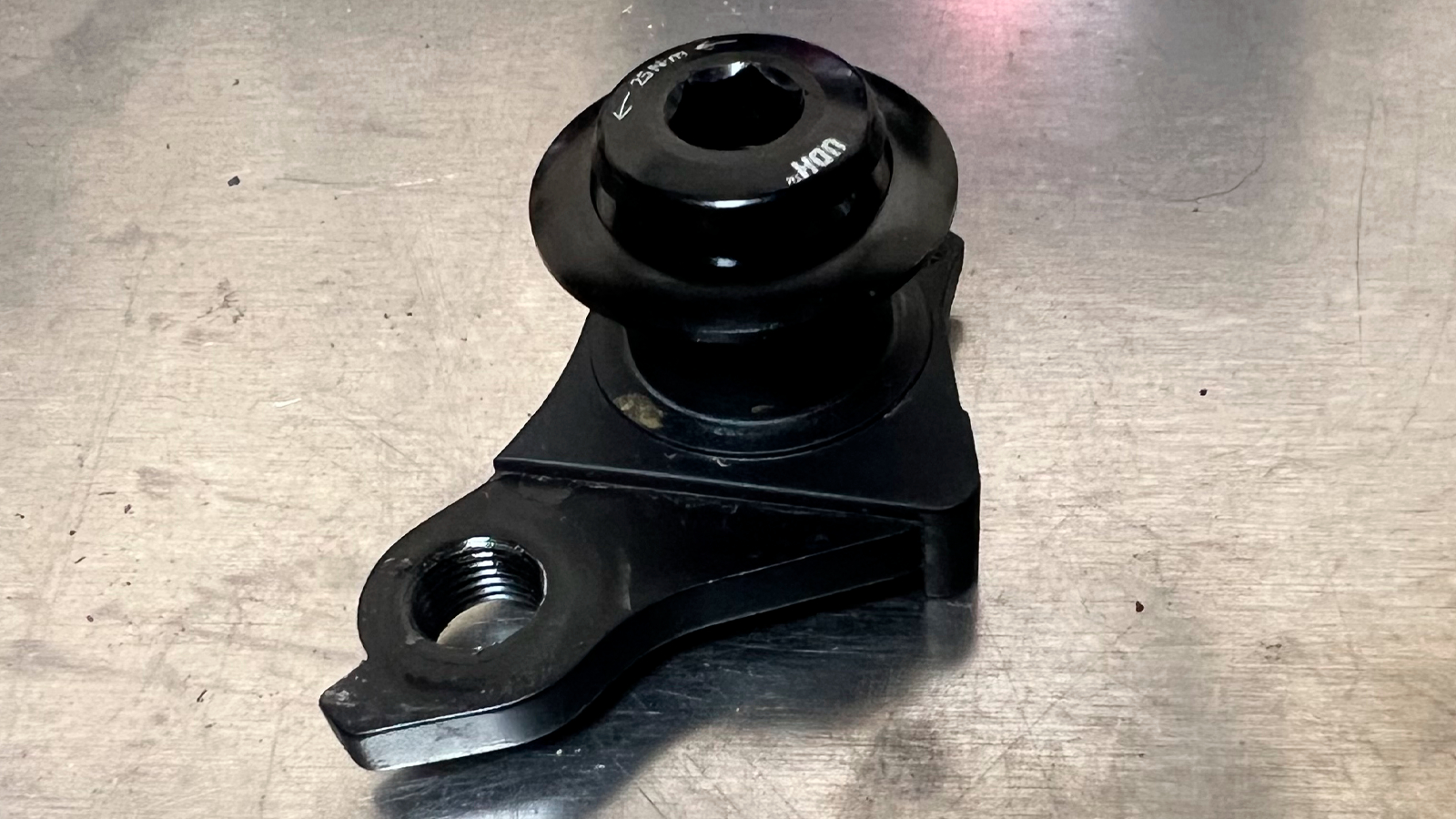
Do I have to have a special bike to fit it?
Sort of. The ‘Full Mount’ T-Type rear mechs will only fit bikes that use a SRAM UDH (Universal Derailleur Hanger). Because they knew they needed to as something big would eventually depend on it, most mainstream bikes made in the last two to three years have adopted that standard already though. You’re less likely to find it on steel and titanium frames, or budget alloy bikes and anything older than three years won’t have a UDH. I wouldn’t be surprised to see some aftermarket companies trying to create aftermarket options for popular older bikes though.
If you're unsure if your bike has a UDH hanger or not, SRAM has put together this handy list of bikes that run it. Less handily though, at the time of writing it doesn't seem to be particularly up to date.
Do I need a new wheel?
Nope, the new cassette fits onto a standard XD freehub driver so any existing SRAM compatible wheel works fine.
What did rear hangers do to upset SRAM so much?
SRAM has been a deliberate disruptor since its first cork-covered twist grips appeared in the 1980s. It has a track record of killing well-established features too, most notably front derailleurs, multiple chainrings and cable operated shift systems. Its beef with hangers is that there were a huge amount of different types, but also that a hanger adds two potentially inconsistent interfaces. One between the rear mech and the hanger and the other between the hanger and the frame. A bit of wobble or looseness in either can really affect a 12-speed system with minimal tolerance between cogs. Bent hangers are also the biggest cause of shifting issues, so to be honest I’m not going to be weeping over their grave too much.
In contrast, T-Type mechs are locked in a single position in relation to the rear axle so everything is connected and constant in its relationship.
Why have I seen so many people standing on the rear mech?
It’s a sales gimmick to show how tough the new Full Mount is. If you’re very old like me you’ll remember that Tonka Toys did the same with a baby elephant and Kirk Precision drove over one of its magnesium bike frames on Tomorrow’s World too. To be honest, it’s quite a good demonstration (I nearly said ‘flex’ but it’s actually the opposite) but there are much better things to stand on for dusting ceilings, grooming giraffes or reaching in high shelves in newsagents.
If the mech is attached to the axle will it fall off when I remove the wheel?
No don’t worry. The axle threads through the Full Mount hardware, but that sandwich clamps onto the frame separately so nothing moves.
Is it completely immovable?
Once you’ve set the correct mech angle using the printed alignment checker and correct chain length and cranked it into place at a hefty 35nm of torque, the mesh won’t normally move. If you hit it hard enough from in front it will slip and rotate backwards to take the impact. Presuming that saved the mech from being destroyed, you’ll then need to reset it before you can carry on.
Is there really no adjustment needed?
There is some, but not as much as previous mechs. Initial adjustment involves checking chain length for your bike on the SRAM index and then setting the angle accordingly. You may have to ‘micro trim’ the indexing on the rear mech via the shifter to get a perfect skip free shift too. Otherwise the fact that Full Mount sits right against the new cassette alignment means there’s no potential difference in how far it needs to move sideways, so there’s no need for limit screws. The preset angle and the fact the mech is now co-axial to the rear axle removes the need for an angle of dangle screw too.
How setup sensitive is it?
With a lot of cogs very close together, 12-speed setups are always going to run closer tolerances than systems with fewer gears. Locking everything down with Full Mount definitely helps with accuracy though and less adjustments mean less chance of screwing things up. It’s still always worth getting adjustment as accurate as possible though and definitely worth reading the instructions.
How does the system ‘know’ where the chain is?
The new cassette has a Setup Cog with narrow/wide teeth like the front chainring. That ensures the chain is in basically the right position relevant to the ‘mapping’ of the different shift teeth and phases. The software in the shifter also recognizes where the mech is in terms of sideways tracking, so it can pick the right moment to make the smoothest possible shift.
Does it really shift better under load?
Yes it does, in both senses of the phrase. It shifts better under load than previous drivetrains because of the stiffness/accuracy of the rear mech and the cassette mapping. It also shifts better under a higher chain load than a more gentle load because that pulls it onto the shift ramps harder for better engagement, making it less likely to skip.
What’s magic about the Magic Wheel?
So glad you asked as I really love this bit of detail. Magic Wheel refers to the separate tooth section of the oversized lower jockey wheel that can still slide round with the chain if the central spoked spider gets skewered and stuck with a stick.
Will it snap my frame?
Now a lot of people are understandably worried about this and some are getting very excited to that effect in comments. And while it hasn't happened to any of the testers I know yet, I obviously can’t categorically say it won’t. What I would say is that between the ‘Overload Clutch’ that lets the mech disengage and move sideways to absorb an impact, the potential rearward Full Mount swing, Magic Wheel and the snappable/swappable bits of the mech itself, SRAM has protected the frame as much as possible.
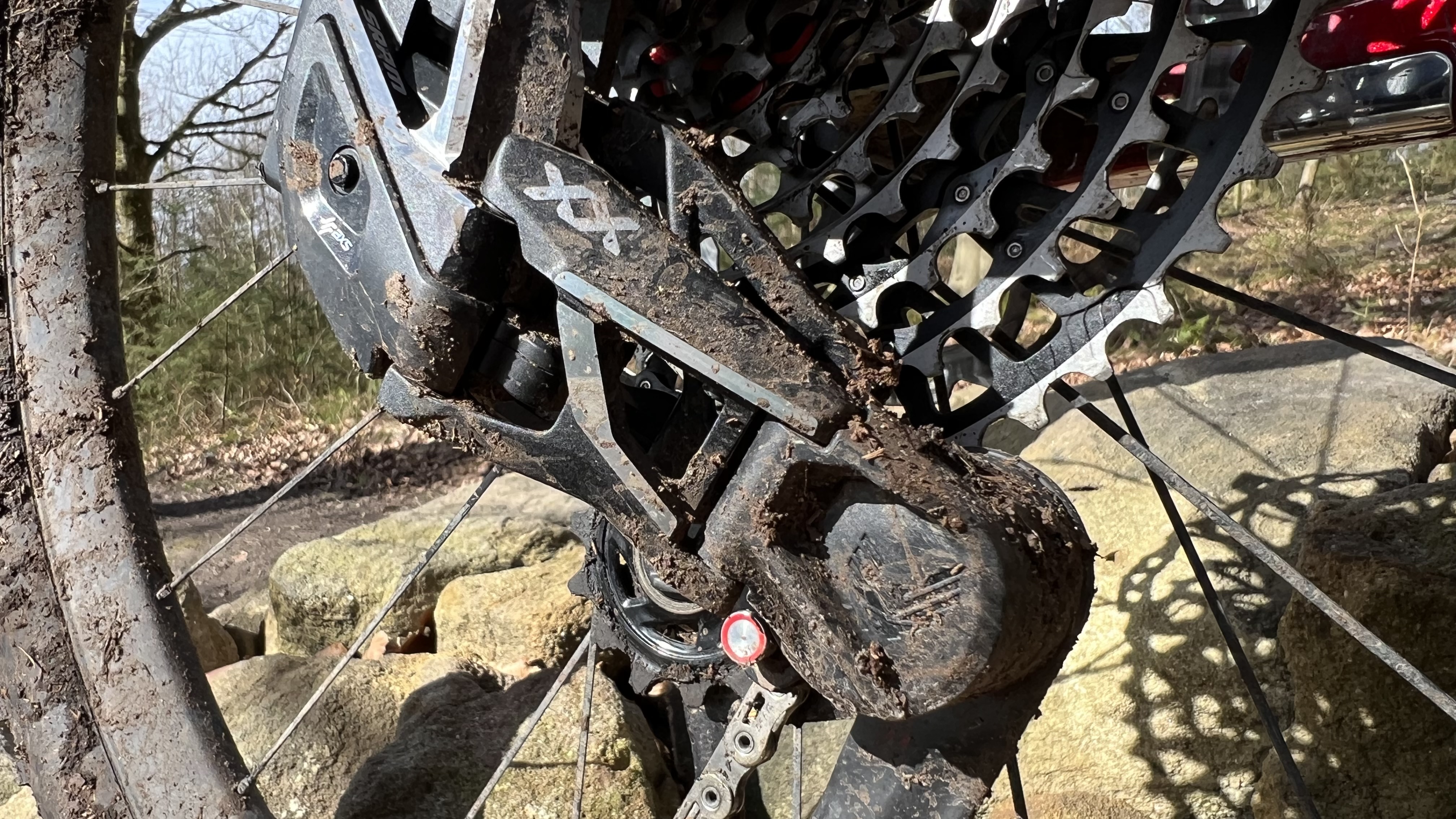
Which bits of the mech are replaceable?
You can pull a T-Type mech into several pieces, but the outer link and ‘scuff guard’ are the main swappable sections for cosmetic and crack replacement reasons. You can also pull the whole jockey cage assembly off for clutch servicing/damage replacement.
The mech looks bent already, is that right?
Yes, the jockey cage is twisted slightly so that the upper and lower wheels align with the cassette and chainring more accurately. The action of the mech also ‘yaws’ slightly as it tracks sideways, again to help create the cleanest, most efficient chain alignment.
Is the clutch stronger?
Yes. There’s more pull back on the chain, so there’s less slap and whip against your frame when things get feisty making for a system that's noticeably quieter on the trail.
Does the mech battery last as long?
Because the clutch is stronger the motors need to work harder to move the mech. That means the batteries don’t last as long, so keep checking the AXS light is green and hasn’t turned red when you’re shifting.
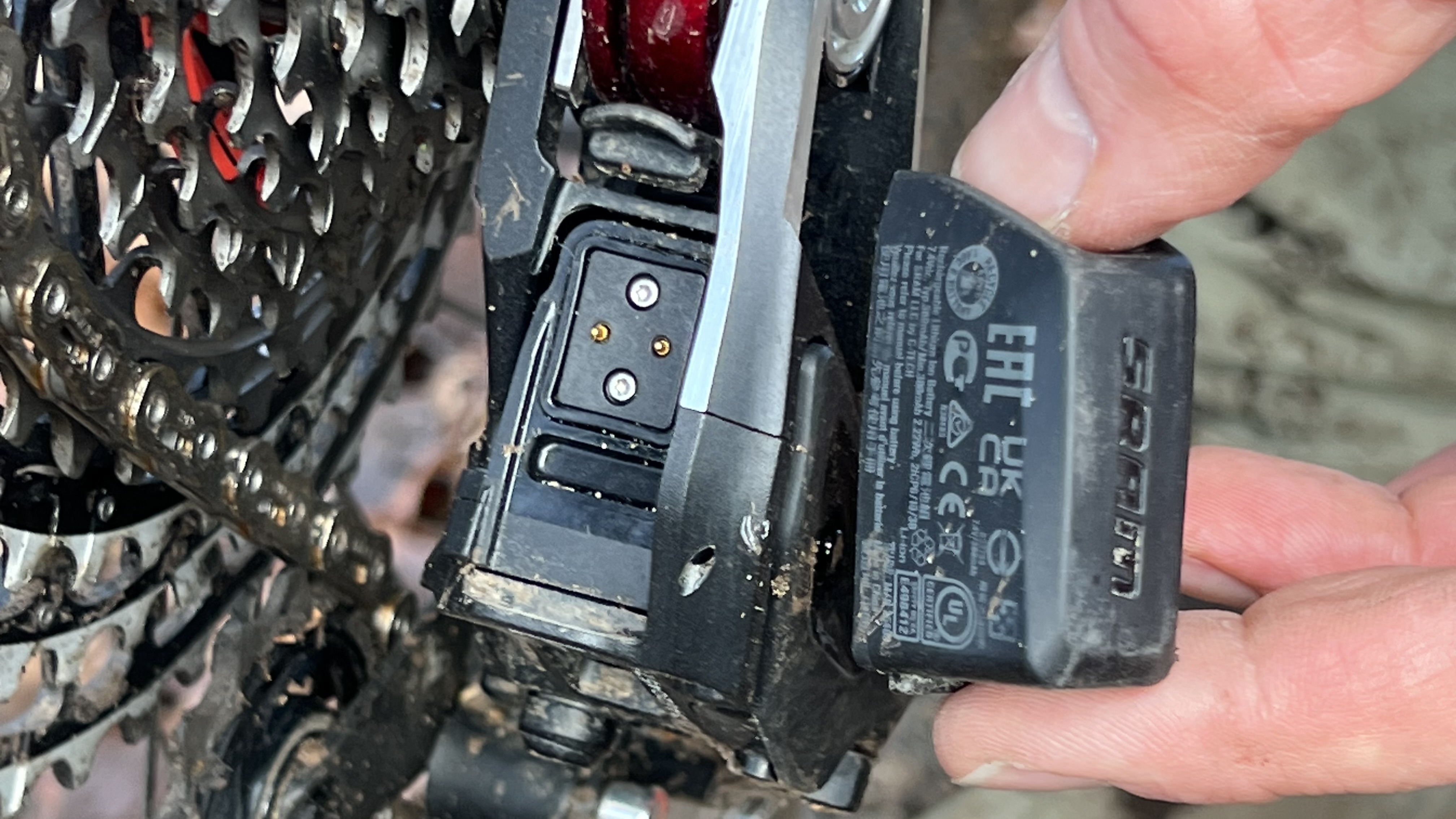
Are the batteries the same as before?
Yes, it uses the same batteries as previous AXS, AXS Reverb and Flight Attendant. The pods run the same CR2032 coin battery too. The only thing to be aware of is that the AAA battery in the torque sensing DUB-PWR crank axle tampon has to be a lithium one if you want consistent readings.
Are the chainring protection segments optional?
Yep, you can bolt them on or take them off. Weirdly the segment I’ve scuffed the most is the one that gets clobbered with my left foot forward although I always coast with my right foot forward so don’t assume you don’t need both.
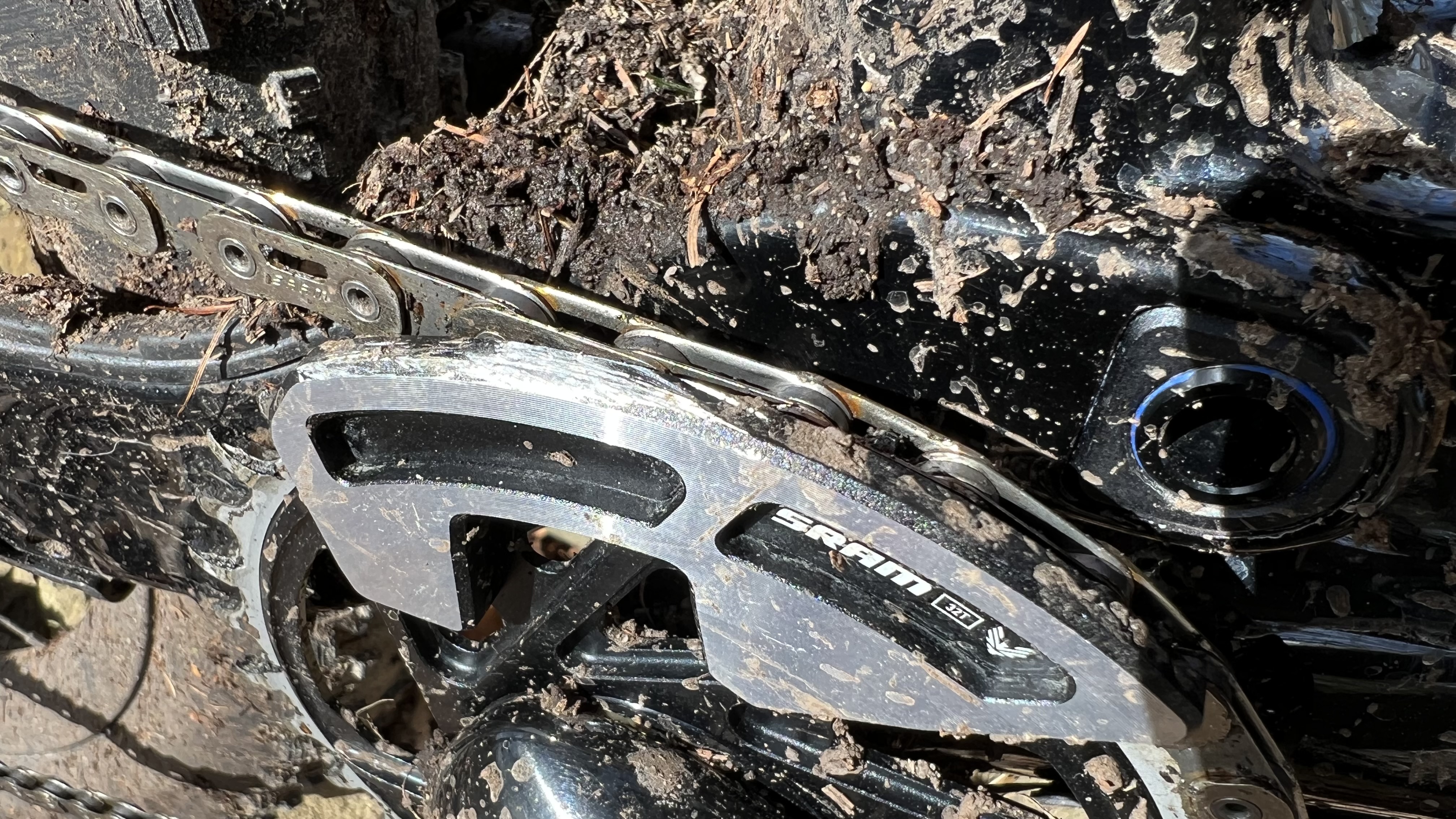
Can you get a narrower Q-Factor than the 174mm standard?
Not on XX and XO, but if you’re a fussy racer who worries about your thigh gap then you can get a 168mm set up for XX SL cranks.
Can I use the rear mech on other setups?
No, T-Type mech needs the matching cassette not to get confused.
Can I use the cassette on other setups?
No, the cassette sits 5mm further out which will confuse other mechs and likely put them beyond the range of the stop screws.
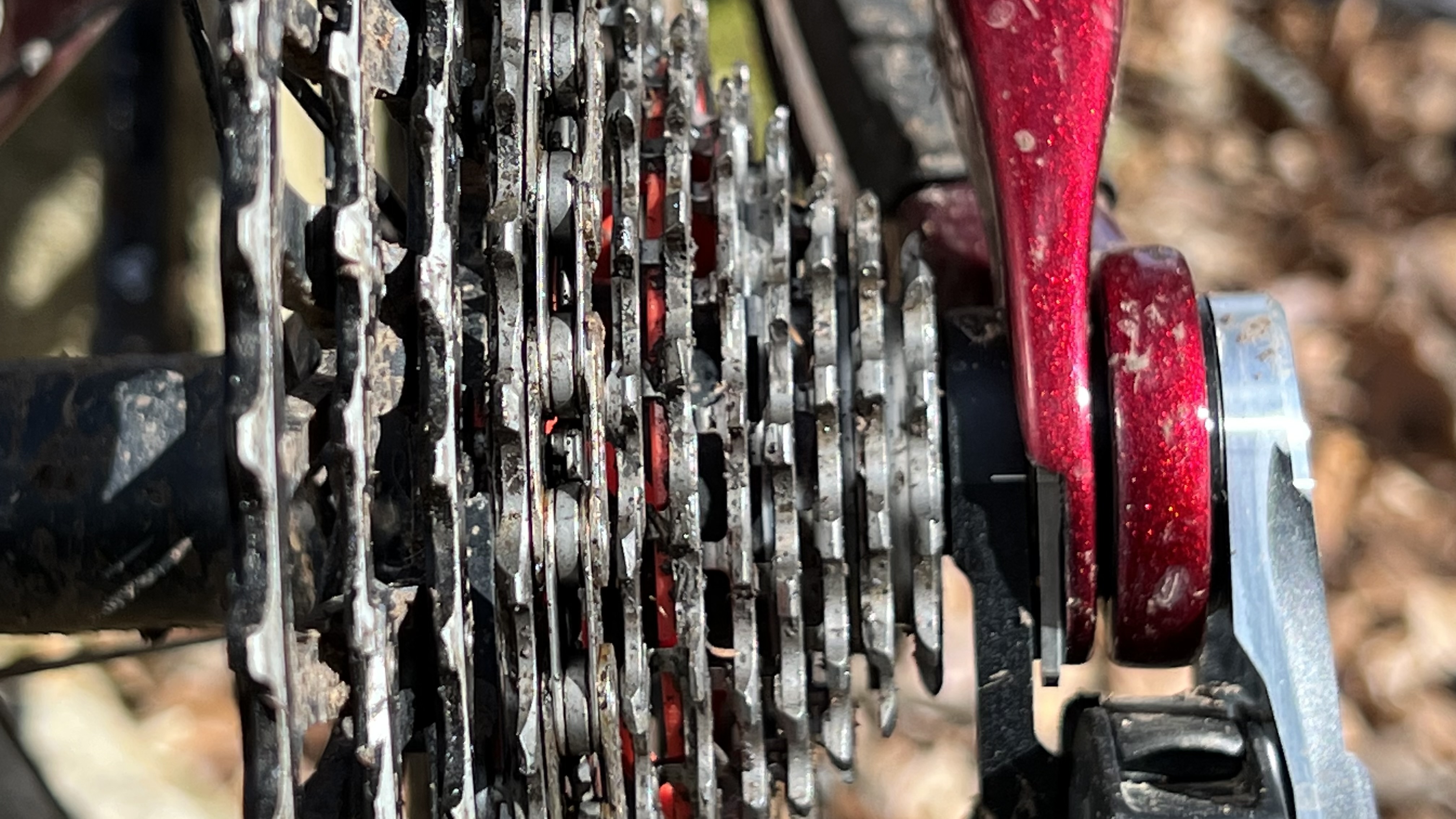
Can I use the chain on other setups?
Yes, the new flat top chain is a gregarious creature that works on old Eagle and other 12-speed road/gravel setups.
Can I use the shifters on other setups?
Yes you can. You could even get a second set to control your Reverb AXS post or Flight Attendant setup.
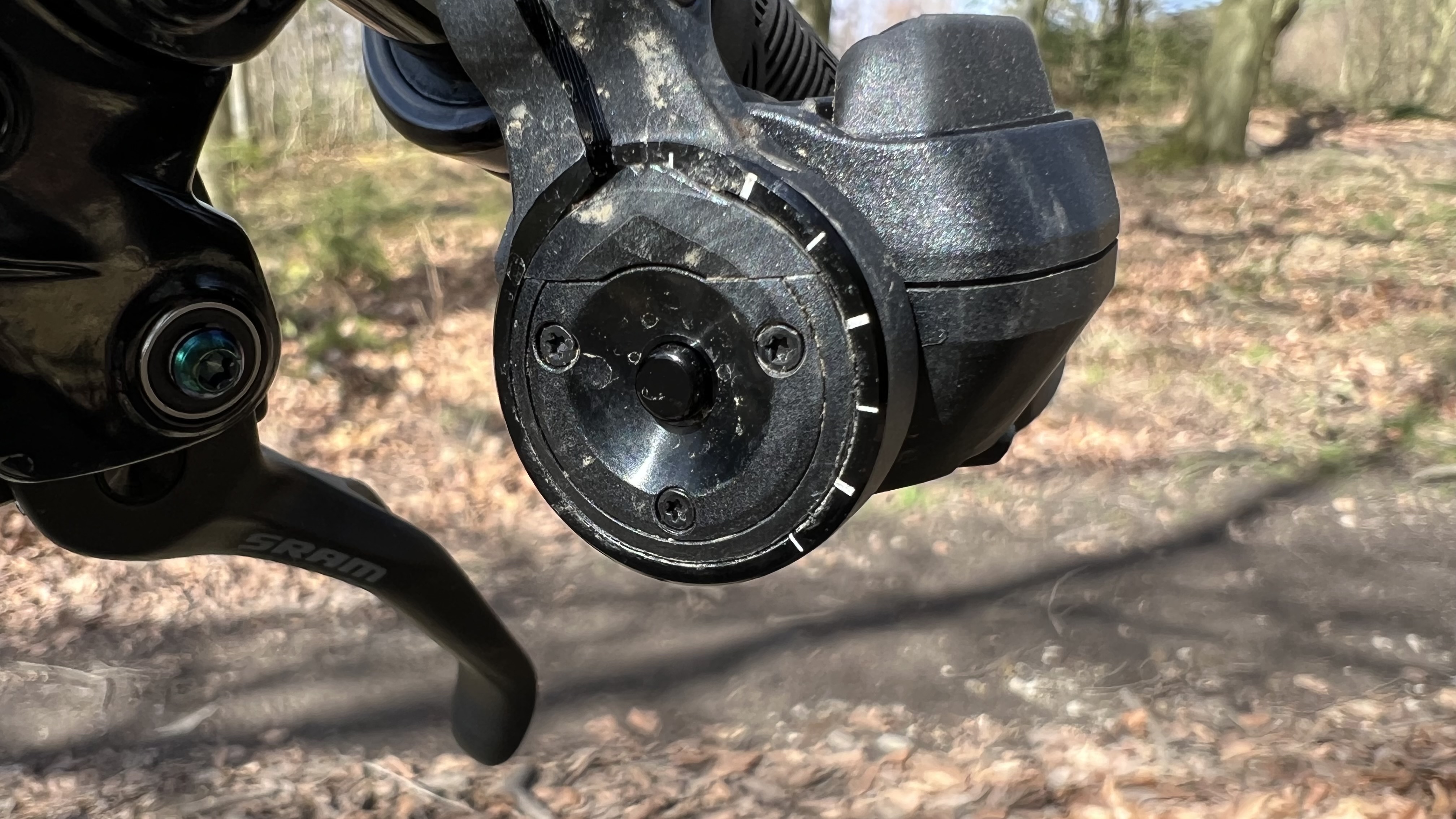
Can I use the shifters with other brands' brakes?
The MMX clamp adaptor will work on SRAM-compatible brakes like Hope and Formula but you can also use the figure of eight clamp to put your pods alongside other brands. It’s quite hard to get a good position with Shimano though because of the secondary support between lever body and grip.
Can I use the cranksets on other setups?
Yes you can as long as they're OK with a wider 55mm chain line. They run on the existing DUB bottom bracket standard too.
Can I use my existing AXS shifters on Eagle Transmission gears?
Yes you can use the old AXS shifters on new Eagle Transmission which is actually quite tempting as I still haven’t found a pod position I’m totally comfortable with. Eagle Transmission works with SRAM AXS drop bar levers too but I can’t think of any gravel frames that have a UDH hanger yet.
Can I use my existing cranks with Eagle Transmission gears?
The reply from SRAM when I asked them was, “It’s possible. But, chain line is wide (55mm to be exact) and optimised for all the other bits and bobs.” In other words yes, but it won’t work as well as it should.
Can I use my existing powermeter/fancy rings on Eagle Transmission cranks?
TBH I’m not totally sure if you can use previous SRAM XX1 Quarq powermeter spider as it would depend on the arm clearance on the spider. If you’re running a left-hand power crank system that will work fine though and any eight bolt standard rings such as eccentrics or fancy colors will fit straight on.
Is SRAM still making previous AXS parts for non UDH bikes?
Yes, it's not leaving you totally out in the cold. Yet.
Will SRAM be releasing leopard skin or national flag versions of T-Type mechs?
OK, nobody besides me was ever going to ask this but just in case you remember the wonderful limited edition ‘colorway’ options of ESP 9.0 it seems like SRAM is in no hurry to repeat the safari or stars and stripes themes. No sign of different metal colors or ‘oil slick’ options yet either but it’s early days.
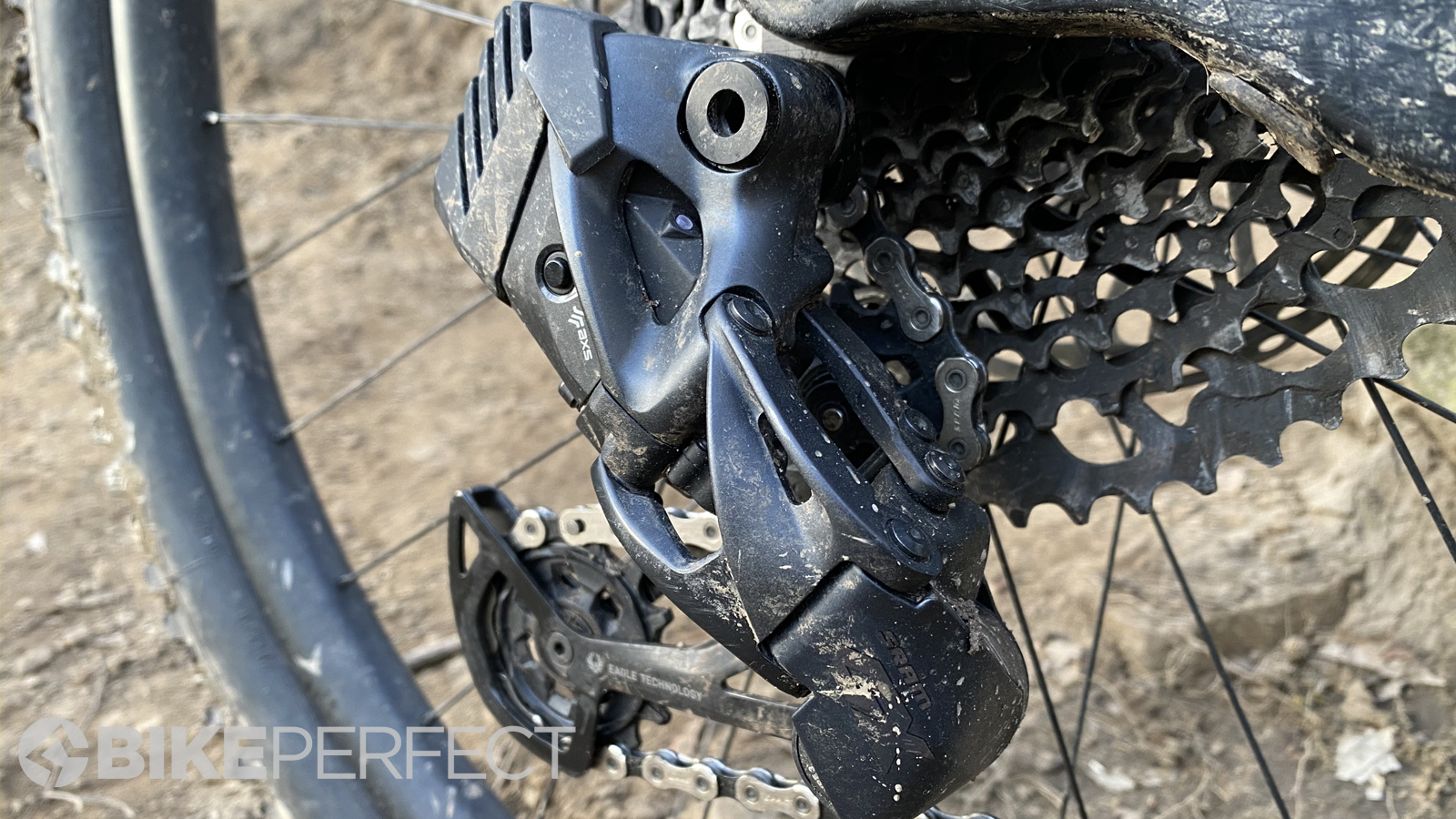
Is there a cheaper version coming?
Now I have to word this carefully as I’m already on the SRAM ‘pest list’ for questions relating to this launch but “I wouldn’t be surprised” if a T-Type version of GX AXS “appeared quite soon” for less money than the new X0.
Will there be a road/gravel version coming?
You’d think that’d be the plan, but SRAM is much less influential with road manufacturers than it is with MTB brands. There’s also no sign of a road version of UDH which would need to seed itself for a few years so there’s enough support for a T-Type road system.
Is Shimano working on a direct mount mech?
Shimano actually got its first over a decade ago with its Hone / Saint / Zee groups which had an extended axle direct fit option but they never took off. It has also logged fresh patents on direct mount tech recently, but we’ve not seen anything in the field yet.
What is SRAM going to do next?
Apart from the obvious ‘release a cheaper T-Type setup’ move, there’s been a presumed SRAM E-bike motor buzzing around enduros and race pits for a while. SRAM has always said it's open to the idea of a gearbox if it can make one efficient enough, but given how much it's invested in T-Type it's probably not rushing to wipe out all its hard work anytime soon.







